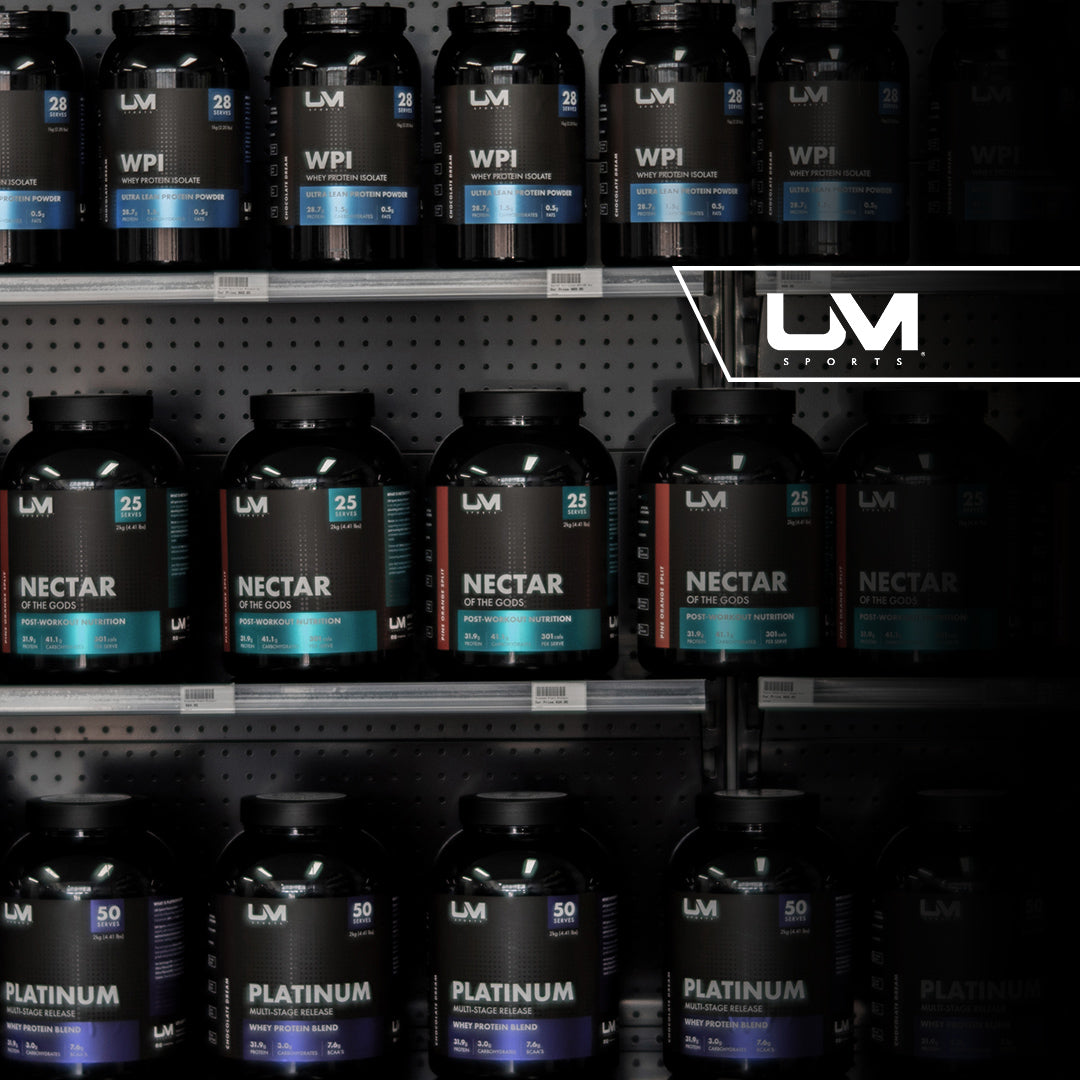
Protein Powder: The Ultimate Guide to Protein Powder Supplementation
The best protein powder depends on your goals. WPI is fast-digesting and great post-workout. WPC is a budget-friendly all-rounder. Casein supports overnight recovery. Plant-based options suit vegan or dairy-free diets. Mass gainers are ideal for building size. Match your choice to your training and dietary needs for best results.
Why Do We Even Need Protein Powder?
First off, why do we need protein? Protein is a key nutrient that helps our body repair and build tissues. It's made up of amino acids, which are like the building blocks for proteins. Out of many amino acids found in nature, only 20 are used by our bodies to make proteins.
Amino acids do more than just make proteins; they're also involved in creating other important stuff in our body, like creatine and hormones, playing a big part in our health (Lopez & Mohiuddin, 2022).
Although adequate protein intake is essential for multiple physiological processes, is incorporating a protein supplement into your diet necessary?
But, do we really need to add a protein supplement to our diet? It turns out, a lot of adults, especially those over 50, aren't getting enough protein from their diet alone. This can make it tough to keep muscle mass and stay strong as we get older.
Research shows that protein powder can help increase muscle size and strength, making it a great option for those looking to boost their fitness levels (Morton et al., 2017).
Choosing The Right Protein Powder
What's the Best Type of Protein Powder?
So we’ve established the importance of protein powder and its health benefits; the next question is, what type of protein should I buy?
Usually, when it comes to whey or plant protein, it comes down to personal preference, dietary restrictions, or lifestyle choices.
This section will explore the different types of protein powder and help you determine which option suits you.
Whey Protein Concentrate (WPC): The most cost-effective form of protein that contains a good balance of amino acids that are well absorbed. WPC is smoother and creamier in taste than WPI, and can be used as an all-rounder protein for everyday use. WPC is best purchased in Whey Protein Blends.
Whey Protein Isolate (WPI): A rapidly absorbed form of protein due to its higher protein content and lower levels of fat and lactose. WPI undergoes further processing to remove impurities, resulting in a more pure form of protein. WPI is best used as a post-workout protein where rapid muscle recovery and growth are needed.
Whey Protein Blend: A blend often consists of all of the above, generally resulting in a protein powder that provides a high protein source perfect for optimal muscle recovery and growth.
Casein Protein: A slow-digesting protein that offers a slower release of protein into the bloodstream. Casein is most commonly used for a sustained source of protein across a period of time, such as overnight or during periods of fasting.
Isolate and Concentrates can also be found in Plant Protein Alternatives, such as Plant Protein by Balance or Lean Vegan Protein by White Wolf Nutrition.
What About Protein Powders with Carbohydrates In it?
Protein powders with carbs can be particularly beneficial for those looking to gain muscle mass and for endurance athletes requiring quick energy replenishment.
These are often referred to as Mass Gainers or Bulking Protein and fall under the category of endurance or recovery supplements.
These protein-carb blends support not just muscle repair but also glycogen replenishment, essential after intense workouts or prolonged physical activity.
When Would I Need a Protein Power with Carbohydates?
For the average everyday gym goer, this type of protein powder will likely not be essential to your supplement regime. These are more suited to people with high-energy demands, or individuals aiming to rapidly increase size.
They're ideal for post-workout recovery, helping to fuel muscle growth and restore energy levels efficiently. If you are looking to lose weight or get lean, you probably want to avoid these and just select a lean protein powder.
Some examples of products we stock for this include Nectar of the Gods, Extreme Mass or Absolute Mass.
How Much Protein Do You Need?
Figuring Out Your Protein Intake
One of the most asked questions is about how much protein to consume. According to Australian guidelines, the general recommendation is 0.8 grams per kilogram of body weight (Health, 2021). But, this is just the minimum to avoid malnutrition. For optimal health, especially if you're sedentary or active, you might need more.
So how much do we really need then if this isn’t enough?
A study was actually done on healthy, sedentary adults in a metabolic ward for eight weeks to determine this (Bray et al., 2012). In this study, participants were divided into three groups, a low protein (0.7g) group, a normal protein (1.8g) group and a high protein (3.0g) group.
Turns out, consuming between 1.2-1.8 g/kg is the more optimal daily protein intake for healthy, sedentary adults.
If we look at this article written by examine.com, which outlines a fairly extensive summary of protein intake based on these findings, we get a more accurate daily protein intake number.
Here's a simple breakdown of recommended daily protein intake depending on your level of activity.
- Sedentary adults: 1.2 - 1.8g per kilogram.
- Active adults: 1.4 - 2.0g per kilogram for maintenance, 1.6 - 2.4g for muscle building or fat loss.
- Experienced lifters on a bulk: Up to 3.3g per kilogram.
- If you're overweight: 1.2 - 1.5g per kilogram.
We recommend using these protein range guides to more accurately calculate your ideal protein intake.
Can You Consume Too Much Protein?
According to Examine.com, limited evidence has been shown that eating a high-protein diet is harmful to human health, assuming there isn’t any pre-existing damage or dysfunction to the kidneys or liver.
If you do have specific kidney or liver issues, you will need to consult with a healthcare practitioner for recommendations on protein consumption.
Please keep in mind that eating more protein than you need will have an impact on your macronutrients, which is always something to keep in mind.
Is There A Best Way To Consume Protein Powder?
Okay so we’ve selected our protein and know how much to consume, what is the best way to consume it?
If you’re calorie conscious, throwing a scoop into a shaker full of water is probably the best option.
if you’re looking to maximise nutritional density (whilst being calorie mindful), blend that sucker with your favourite dairy or nut milk, and include a range of wholesome berries, coconut flakes, and peanut butter (skip for allergies of course).
You may also choose to dump in a heaping scoop of your favourite greens powder, such as Vitality by Switch Nutrition or Oxygreens by EHP Labs.
Don’t be afraid to get creative with protein powder and mix it into yoghurts, and cereals or add it to cooking.
We absolutely love adding Platinum Blend by UM Sports to greek yoghurt, it creates a healthy chocolate mousse!
When Should Protein Powder Be Consumed?
We’re often told that it’s absolutely critical to consume protein immediately after a workout. That’s actually not entirely true.
While it is definitely beneficial to consume protein post-workout, it’s not the most important factor to consider for muscle growth.
Instead, we should be more aware of the total amount of protein we consume through-out the day, rather than the tiny snippet of time we allow after our workout (Schoenfeld et al., 2013).
In other words, it is more important to ensure that we consume sufficient protein daily, rather than focusing solely on the timing of protein consumption.
This means we must ensure each meal has sufficient amounts of protein (approx. 30g is a good number), and we can supplement with protein powder between our core meals of the day.
Frequently Asked Questions for Protein Powder Supplementation
Can the body only use 30 grams of protein at once?
No, there's no strict limit. While around 30 grams per meal can optimise muscle synthesis, the body processes all the protein you consume, but more isn't necessarily better for muscle building.
Does more protein mean faster muscle gain?
Yes, to a certain extent. Exceeding your protein needs for muscle synthesis will not boost muscle growth further and could affect your intake of other important nutrients. Protein still contributes to total calorie intake, so if you exceed more than you need and offset your other nutrients, it can lead to weight gain.
Can eating too much protein make me fat?
Yes, consuming calories in excess, regardless of the source, can lead to weight gain. Protein can be harder to convert into fat compared to other macronutrients, but the surplus will still impact your weight. It's always best to ensure you have a plan when it comes to macronutrient intake. Our recommendation when compiling a plan is calculating your protein intake requirements first.
Does cooking denature protein powder, making it less effective?
Cooking protein powder does alter its structure, but it doesn't affect its nutritional value or the body's ability to use the amino acids. You would need extremely high heat for extended periods of time to completely denature your protein powder.
Is real food better than protein powder?
You should always adopt a "from real food first" mentality, but both have their place. Whole foods offer additional nutrients, while protein powder provides convenience and rapid digestion post-workout. Depending on your level of training, it can also be hard to consume the amount of protein you need just from your diet, it just makes sense to supplement sometimes.
Do certain conditions increase protein needs?
Yes, stress, illness, injury, or heavy caloric restriction can raise your protein requirements to maintain muscle mass.
Who needs more protein: weightlifters or endurance athletes?
Needs vary based on training intensity and goals. Both groups may require high protein for recovery and performance, with specific needs depending on individual energy expenditure and fitness objectives. This is why we have different protein intake requirement based on your level of physical activity.
The Quick Takeaway
Wrapping up, this guide serves as your all-encompassing resource for navigating the world of protein powder, from understanding its fundamental importance to selecting the ideal type and determining the right amount for your lifestyle.
Whether you're aiming to boost muscle growth, maintain strength, or simply ensure your nutritional needs are met, protein supplementation can play a crucial role.
Always remember to balance your intake with a wholesome diet and consult a healthcare professional if you have specific conditions. Let this guide empower you to make informed choices on your journey towards optimal health and fitness.
References
-
Lopez, M. J., & Mohiuddin, S. S. (2023). Biochemistry, Essential Amino Acids. In StatPearls. StatPearls Publishing.
- Bray, G. A., Smith, S. R., de Jonge, L., Xie, H., Rood, J., Martin, C. K., Most, M., Brock, C., Mancuso, S., & Redman, L. M. (2012). Effect of Dietary Protein Content on Weight Gain, Energy Expenditure, and Body Composition During Overeating. JAMA, 307(1), 47.
- Health, N. (2021, April 12). Protein | Eat For Health. Eatforhealth.gov.au.
- Krok-Schoen, J. L., Archdeacon Price, A., Luo, M., Kelly, O. J., & Taylor, C. A. (2019). Low Dietary Protein Intakes and Associated Dietary Patterns and Functional Limitations in an Aging Population: A NHANES Analysis. The Journal of Nutrition, Health & Aging, 23(4), 338–347.
- Morton, R. W., Murphy, K. T., McKellar, S. R., Schoenfeld, B. J., Henselmans, M., Helms, E., Aragon, A. A., Devries, M. C., Banfield, L., Krieger, J. W., & Phillips, S. M. (2017). A systematic review, meta-analysis and meta-regression of the effect of protein supplementation on resistance training-induced gains in muscle mass and strength in healthy adults. British Journal of Sports Medicine, 52(6), 376–384.
- Schoenfeld, B. J., Aragon, A. A., & Krieger, J. W. (2013). The effect of protein timing on muscle strength and hypertrophy: a meta-analysis. Journal of the International Society of Sports Nutrition, 10(1).
Authors:
Stephen Brumwell, Nutritionist (ANTA #40048)
Reviewed:
Teigen Faux, Exercise Physiologist (Honours) for Scientific Accuracy

